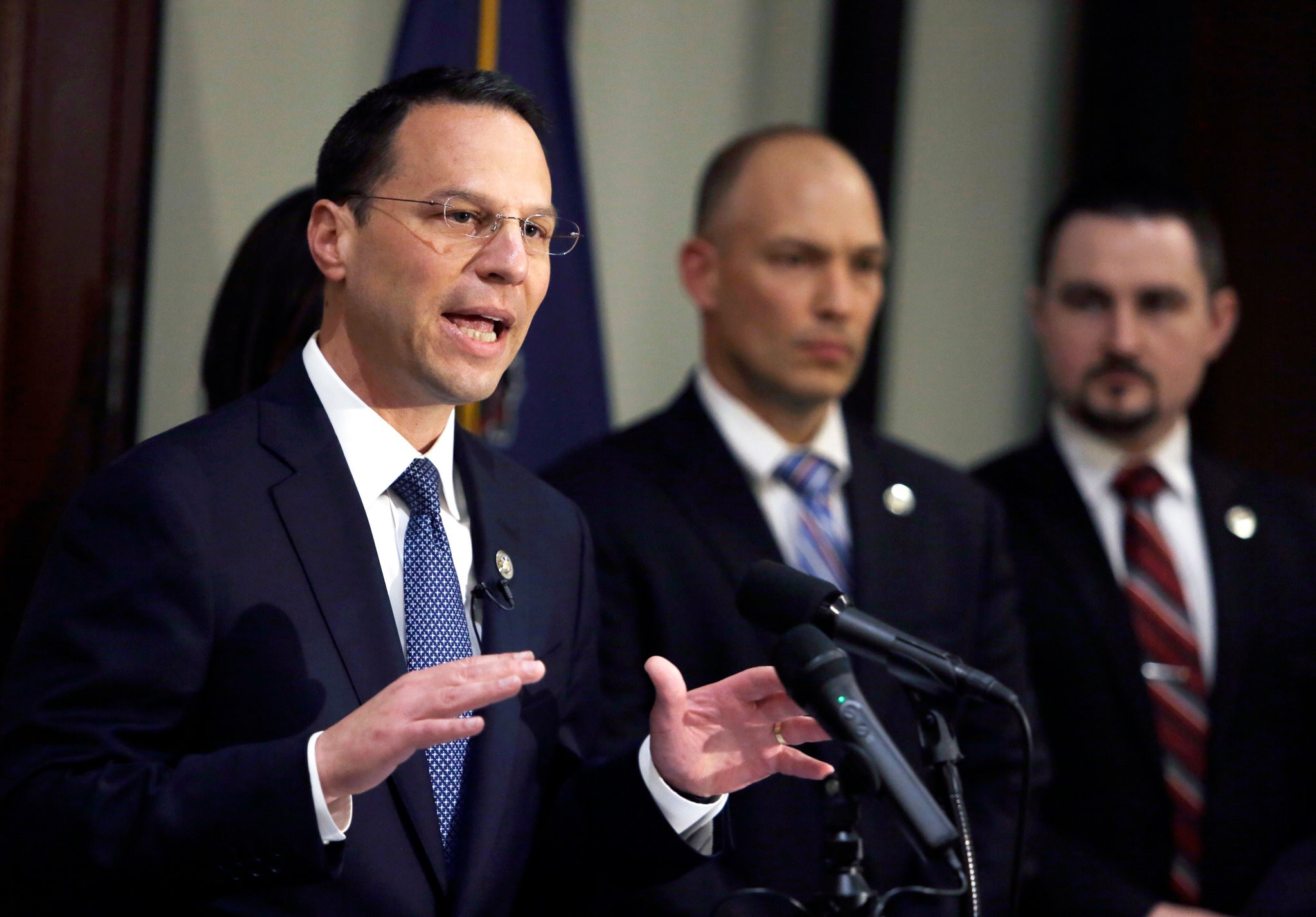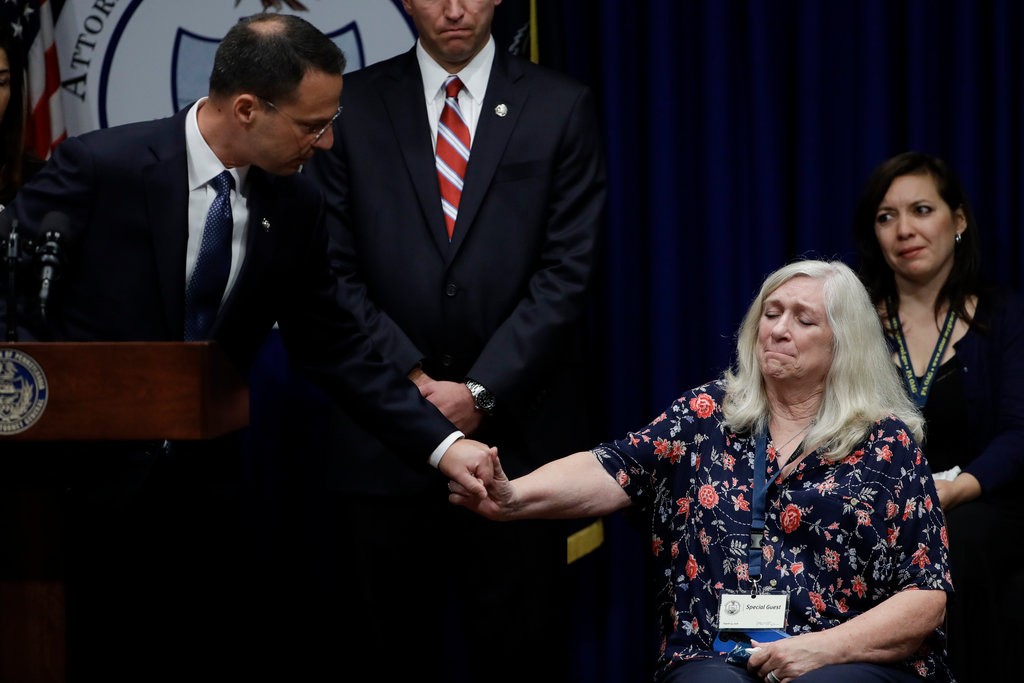Meet Josh Shapiro, the Man behind the Bombshell Investigation of Clergy Sexual Abuse
By Elizabeth Dias
Josh Shapiro had no idea about the secret grand jury investigation that was waiting on his desk when he was sworn in as attorney general of Pennsylvania last year. But he pushed the nascent inquiry forward with the ďfull forceĒ of his office, and this month that investigation ó into the Catholic Churchís cover-up of sexual abuse of more than 1,000 children over decades ó was finally revealed in a bombshell report, prompting outrage, anger and international calls for legal and spiritual reform. ďIt just was the most purposeful thing, short of giving life to our four children, Iíve ever done in my life,Ē Mr. Shapiro said in a phone interview. His investigation into Catholic clergy sexual abuse has certainly garnered the most public attention, but even before it Mr. Shapiroís broader national profile had been rising. Just two weeks after he was sworn into office, he and other attorneys general fought President Trumpís first travel ban. In December, he got an injunction to halt Mr. Trumpís birth control rollback. Last month, he sued to stop Pennsylvanians from being able to download plans to print 3D guns. Mr. Shapiro talked with The New York Times about the blockbuster report, the possibility of a federal grand jury investigation, how this case has influenced his own spirituality, and his political ambitions. The following is an edited and condensed version of that conversation. Q. You graduated from Georgetown Law, a Jesuit school, in 2002, right when the Catholic clergy child sex abuse scandal in Boston was breaking. How did that influence you? A. Iíve really focused a lot on child welfare and dealing with child abuse issues. I can remember as a young boy, early teenage years, going with my dad, whoís a pediatrician, when my dad would testify on behalf of the commonwealth in child abuse cases. This has been something that has been part of who I am, literally, as Iíve grown up. This particular investigation actually started in 2016, not too long before your tenure. Walk me through what happened when you took office, when this landed on your desk. Obviously, I didnít know about it. It was a secret grand jury investigation. I was presented with an investigation that was in its very, very early stages, and presented with the choice of moving forward with this investigation or ending it. Really? Yes. I made it clear I wanted the investigation to continue. I put the full force of our office into this investigation. Tell me about some of the key moments along the way. There was one bishop, Bishop Lawrence Persico of Erie, who, unlike all the other bishops, actually agreed to testify before the grand jury. I went to Erie to see him, to try to search for some common ground with him, whereby which he would agree to publicly state that there were efforts to try to shut this down, and that he would not participate in those efforts. I knew that if I could convince Bishop Persico to say that, it would force the hand of the other bishops. Each of the other bishops, almost immediately, came out and made statements that they too wouldnít block the report ó when at least two of them were working behind the scenes to shut the report down. Which two? It was [the dioceses of] Greensburg and Harrisburg. There were all kinds of efforts being led by our opponents within the church, and supporters of the church, really powerful lobbyists and lawyers who would file all kinds of motions ó which, again, I think a lot of that I still canít speak about ó or take certain steps to either derail our investigation or shut it down. Image
You sent a very public letter to Pope Francis, asking him to personally tell church leaders to stop blocking the release of the investigationís findings. Did you ever hear back from him? Weíve heard back now twice through the popeís spokesman, Greg Burke. Of course the couple-thousand-word letter from the pope a few days ago. Thatís the public response. Nothing to you? Not to date. I had the high honor of meeting the pope, as I described in that letter. Not only was it such a moving and spiritual moment for me to meet the Holy Father; literally minutes after we met, steps from where we met, he visited with abuse victims, and set a new standard for the church that his own leadership in Pennsylvania was not meeting. I thought it was important for him to know. What have you heard from other attorneys general in other states about pursuing similar investigations? I have heard from several attorneys general of both parties, from really across the country, trying to understand how we conducted our investigation, asking in some cases general ó and in some cases very specific ó questions about either the broad structure of an investigation, or a specific priest who might now be within their state. Should Jeff Sessions open a federal grand jury investigation on Catholic clergy child sex abuse? I have spoken to a representative of the Department of Justice. Beyond that, I do not think it would be prudent for me to comment. Did they reach out to you? Yes. After the release? Yes. After the release, and related to the release of our report. Iíve heard questions about the report in a few areas. People say to me, O.K., there are hundreds of allegations in the report. How did the attorney general determine which were true and which were false? Or is just every accusation from decades in there? While the grand jury named 301 predator priests, they actually got reports on more than 400. What we did in this process was to be very conservative in how many, and which, predator priests were named. Another question Iíve been getting: Was the rate of abuse higher in the Catholic Church than in other institutions during the same time period? Really what people have asked is, why single out the Catholic Church? My record is very clear. We handled the Penn State case and got convictions on all three senior-level officials, the president and the two vice presidents for covering up the Sandusky crimes. We just arrested a local police chief and a local deputy coroner and county prison guards for covering up sexual abuse, in some cases of minors, in other cases of adult women. We go after these kinds of cover-up and abuse wherever we find it. Do you think the Catholic Church has made any progress in stopping child sexual abuse in the last 30 years? The notion this is just something that happened a long time ago, and that we need to move on, is exactly the wrong response. Child rape is child rape, whether it happened in 1970 or it happens in 2018. There is no excuse for allowing it. And there is no excuse for covering it up. Are you worried at all about alienating Catholic voters in Pennsylvania? I never once thought about the politics of this. And frankly, to do this job effectively, you canít think about the politics of any investigation. Iíve always believed, since my first time running for office, that good government is good politics. More personally, you are Jewish. How has this investigation influenced your own spirituality? My faith and my family are central to my life and ground me. We do celebrate the Sabbath each week together as a family. As a person of deep faith, I was deeply offended by the weaponization of faith that we found in the grand jury investigation. I am in public service because Scripture teaches us that no one is required to complete the task, but neither are we free to refrain from it. Everyone has a responsibility to get off the sidelines, get in the game and do their part. Did you ever encounter any pushback fighting the Catholic Church on this issue as a Jewish man? Certainly Iíve experienced anti-Semitism. There were a number of statements, emails. I donít read a lot of my social media, but social media postings like that, that were just clearly anti-Semitic. I frankly donít pay any of that much mind. If at the end of the day, your response to the grand jury report, which uncovered this type of horrific abuse and cover-up, is to attack me with an anti-Semitic slur, then frankly youíve got the issue. In the midst of this investigation, youíve been aggressive on a number of other fronts. What do you see as your role in this political moment? Thereís a lot the president does that I disagree with, but Iím not some congressman that just opines all day about stuff. My job is to adhere to the rule of law and make sure the law is being followed. Where I see it not happening, like for example when the president decided he didnít like Obamacareís guarantee that women would have access to contraception, and just one day did away with it, whether you agree or disagree with his decision ó I obviously disagree ó the fact is that the rule of law requires him to continue to provide access to contraception. We sued and won a nationwide injunction. Similarly, when he authored his travel ban, which ultimately became law, the second one or third one, I didnít sue him. Even though I thought it was the worst policy and makes us less safe and is fundamentally wrong, I thought what he did was lawful. So, what happens next? Youíve got a big political fight coming up in the Legislature now about changing statute of limitation laws. The majority leader in the statehouse has said their first order of business is going to be to bring up a bill that will basically contain these four recommendations. I donít know how any responsible lawmaker, after reading this report, and reading the specific recommendations of the grand jury, could not vote in favor of that legislation.
|
.
Any original material on these pages is copyright © BishopAccountability.org 2004. Reproduce freely with attribution.

